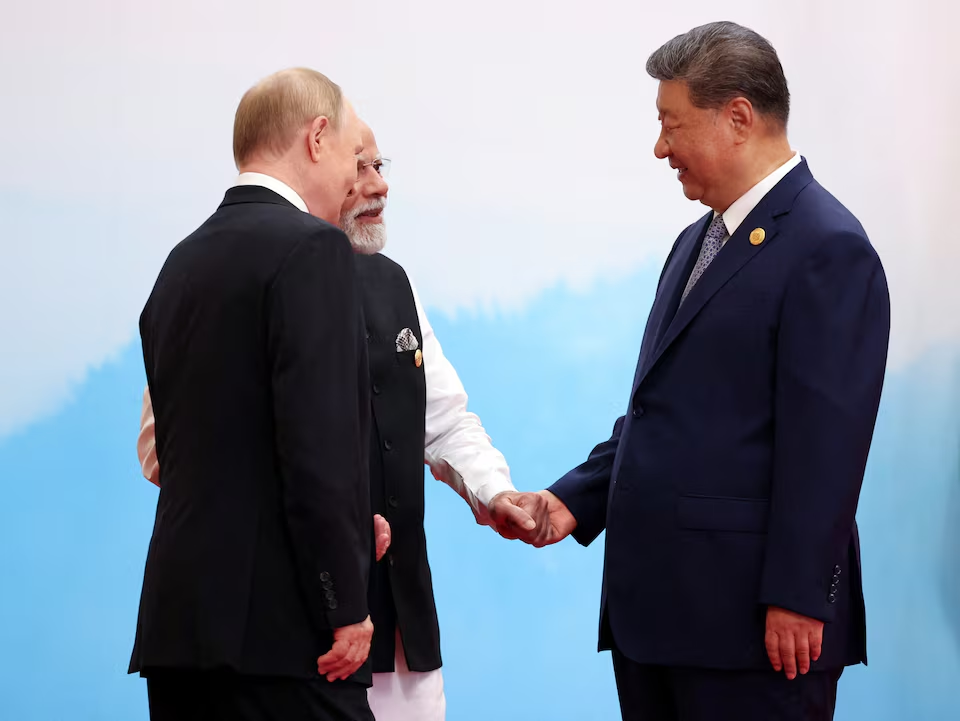Modi Deepens Ties with China and Russia as Trump-India Relations Sour
At the same time, Modi is signaling a willingness to expand relations with Moscow and ease tensions with Beijing, a notable shift given the historically fraught ties between India and China.
Modi Deepens Ties with China and Russia as Trump-India Relations Sour
Images this week of Indian Prime Minister Narendra Modi holding hands with Russian President Vladimir Putin at a summit hosted by Chinese President Xi Jinping have highlighted a significant shift in India’s foreign policy balance, dealing a blow to Washington’s decades-long effort to draw New Delhi firmly into its strategic orbit.
For successive U.S. administrations, India was seen as a crucial counterweight to China and Russia. Yet, Modi’s visible warmth toward Moscow and Beijing in Tianjin suggests that President Donald Trump’s policies may have undermined that goal. The Trump administration has slapped 50% tariffs on Indian goods and publicly criticized New Delhi’s continued purchase of cheap Russian oil, leaving India increasingly skeptical of Washington’s reliability as a partner.
U.S.-India Ties Deteriorate as Rivals Draw Closer
Reuters says Even as India’s relationship with the U.S. cools, China, Russia, and North Korea have displayed growing solidarity. Their leaders appeared together at a World War Two commemoration ceremony in Beijing — a symbolic demonstration of tightening ties among Washington’s adversaries.
At the same time, Modi is signaling a willingness to expand relations with Moscow and ease tensions with Beijing, a notable shift given the historically fraught ties between India and China.
Ashley Tellis, a former White House official now at the Carnegie Endowment for International Peace, warned:
“We may be locked into a long downward spiral because neither leader is willing to pursue the personal outreach necessary to repair the relationship.”
India’s Growing Frustration
Indian officials have expressed anger at the Trump administration for repeatedly rejecting trade proposals, honoring Pakistan in public forums, and even claiming credit for easing the decades-long India-Pakistan conflict — a matter New Delhi insists is strictly bilateral.
Tanvi Madan, a South Asia expert at the Brookings Institution, noted:
“It strikes Indians as odd to be criticized for meetings with Xi and Putin just weeks after Trump himself rolled out the red carpet for the Russian leader and announced plans to meet Xi.”
White House Response
White House spokeswoman Anna Kelly defended Trump’s approach, saying his foreign policy record is “unparalleled because of his uncanny ability to look anyone in the eye and deliver better deals for the American people,” citing his role in brokering an India-Pakistan ceasefire.
She added that Trump and Modi “have a respectful relationship” and that both governments remain in close communication across the diplomatic, defense, and commercial fronts.
China vs. India
Modi’s warming ties with Xi Jinping are particularly significant given the two nations’ history of mistrust and open conflict, including a deadly border clash in 2020. His trip to China marked his first in seven years, signaling a reset in the relationship.
Trump, meanwhile, has insisted that U.S.-India relations remain strong but framed the partnership in stark terms:
“We get along with India very well. But you have to understand, for many years it was a one-sided relationship.”
BRICS and Trump’s Rhetoric
India, China, and Russia are all founding members of the BRICS alliance, which Trump has derided as “anti-American.” Another BRICS member, Brazil, has also come under fire from Trump’s administration, with Washington imposing tariffs and accusing Brasilia of pursuing a “witch hunt” against Trump ally and former president Jair Bolsonaro.
White House trade adviser Peter Navarro went further, saying:
“It’s a shame to see Modi, as leader of the world’s largest democracy, getting in bed with the two biggest authoritarian dictators in the world — Putin and Xi Jinping.”
Risks to the Quad
Trump initially courted India in his first term, hosting the “Howdy Modi” rally in Texas in 2019 and reviving the Quadrilateral Security Dialogue (Quad) alongside Japan and Australia. Yet, since returning to office, Trump has taken a harsher stance on trade and immigration issues, frustrating New Delhi.
India had been expected to host a Quad summit in November with a sharper focus on countering China’s influence, but Trump has yet to commit to attending. Instead, his administration is prioritizing a sweeping tariff deal with China ahead of the same deadline.
Ashley Tellis observed:
“For now, in Trump’s worldview, there’s no great power competition that requires the Quad.”
The Road Ahead
Analysts suggest that repairing the U.S.-India relationship may require far more effort than it took to break it. Brett Bruen, a former White House adviser under President Barack Obama, summed it up:
“India is a clear example of a country that, for historical, political and economic reasons, won’t simply bow down to Trump. They have other options.”










